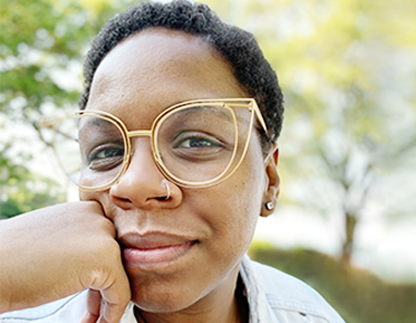I'd say don't be afraid to work hard for what you want and what you believe in and to do that even when folks do not recognize your value.”
Gabrielle Randle-Bent (she/her)
PhD Candidate in the Interdisciplinary PhD in Theatre and Drama Program

Gabrielle Randle-Bent is a PhD candidate in the Interdisciplinary PhD in Theatre and Drama (IPTD) Program in the School of Communication. Her research focuses on affect, Blackness, and performance. She studies performance that feels Black. Her work moves through history, theory, and practice, tracing a relationship between the conscious political choice to perform Black Feeling and the wider cultural implications of an articulation of a heterogenous but resonant Black experience.
How would you describe your research and/or work to a non-academic audience?
I think about how Blackness is boundless and how Black People can do anything and have done just about everything. I believe that because of this there are resonances in a culture that are traceable through affect. I love thinking about how and when performance feels Black and then navigating the archive to try to understand why.
Tell us what inspired your research and/or work.
I am inspired by the people I come from, no matter what I'm applying for my cover letter always begins: "I come from simple, hardworking people, who come from simpler, harder working people." The world I come from is beautiful without being romantic, hilarious without being frivolous. It is a place of faith, fortune, and failure and most importantly it is a place where nothing is wasted. If there is nourishment to be found, I have been taught how to find it. No other aspect of my life has so singularly colored how and why I do what I do.
What do you find both rewarding and challenging about your research and/or work?
I think that the distinction between being an artist and a scholar is a really special challenge. As a theorist, I get to have big ideas about performance, humanity, race, class, and history. As an artist, I get to work with talented people and tell impactful stories. Those two things feed each other, both expanding possibilities but also building accountability. It's one thing to think big thoughts in an academic setting, but then to have to think about how those ideas are performed in a community is a really important challenge. Similarly, too often in practice, we think that the way something has always been done is the way it should be done, or even the only way we might do it. Theory cracks open expectations and allows for freedom and exploration that deepens what's possible in artmaking.
What did you originally want to be when you grew up?
I wanted to be an architect because that was the first job alphabetically that I thought would be very cool. I then thought I wanted to be an engineer because it was like an architect but with more math and science, which I was pretty good at. And then I realized that the thing about engineering I loved was problem solving, but I liked people's problems more than I liked equations. So, I tried technical theatre and eventually directing. It is just now occurring to me that if I’d just gone one more word down that list, I'd have made it to “artist.”
What advice would you give your younger self or someone considering a similar path?
I'd say don't be afraid to work hard for what you want and what you believe in and to do that even when folks do not recognize your value. It's great to have to become articulate about your worth, even if it's just a thing you repeat over and over again to yourself. I've found that now that I have some small modicum of success, people are eager to speak of and define my worth. But I feel grateful that I know exactly who I am and what I am capable of because it was etched into my heart when no one else was looking.
Tell us about a time when things did not go as you planned, what did you learn?
Almost no things in my career have gone to plan. I graduated from undergrad into a recession, I was rejected the first time I applied to grad school, I never thought I'd end up in Evanston, much less find love in my cohort, have two kids in a pandemic and accept my dream job before I finished dissertating. I think I've learned that planning is great. It is important to clarify goals and set priorities. It helps when there are setbacks to see how far you've come. I've also learned that letting go of plans is even better!
Published: November 15, 2022
If you know a graduate student, postdoctoral trainee, graduate faculty member, staff member, or a member of our TGS alumni population who would make a great candidate for our TGS Spotlight Series, please complete this brief TGS Spotlight Series Nomination Form.